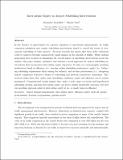| dc.description.abstract | In the absence of opportunities for capacity expansion or operational enhancements, air traffic
congestion mitigation may require scheduling interventions aimed to control the extent of overcapacity
scheduling at busy airports. Previous research has shown that large delay reductions
could be achieved through comparatively small changes in the schedule of flights. While existing
approaches have focused on minimizing the overall impact of scheduling interventions across the
airlines, this paper designs, optimizes, and assesses a novel approach for airport scheduling interventions
that incorporates inter-airline equity objectives. It relies on a lexicographic modeling
architecture based on efficiency (i.e., meeting airline scheduling preferences), equity (i.e., balancing
scheduling adjustments fairly among the airlines), and on-time performance (i.e., mitigating
airport congestion) objectives, subject to scheduling and network connectivity constraints. Theoretical
results show that, under some scheduling conditions, equity and efficiency can be jointly
maximized. Computational results suggest that, under a wide range of current and hypothetical
scheduling settings, ignoring inter-airline equity can lead to highly inequitable outcomes, but that
our modeling approach achieves inter-airline equity at no, or small, losses in efficiency.
Keywords: airport demand management, inter-airline equity, efficiency-equity trade-off, integer
programming, dynamic programming, queuing model | en_US |
